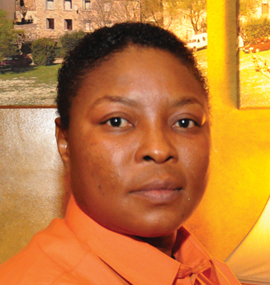UK treatment of LGBT asylum seekers under fire

Aderonke Apata
Britain’s Home Office has caused a public outcry over its treatment of LGBT asylum seekers.
Aderonke Apata, a Nigerian LGBT rights campaigner, applied for asylum in the UK after facing persecution in her native home as a result of her sexuality.
However, after twice failing to convince the Home Office of her sexual orientation, Apata faces deportation to Nigeria, where homosexuality is a crime punishable by death.
The barrister representing Home Secretary Theresa May dismissed Apata’s claims based on the grounds that she had a previous heterosexual relationship and children as a result of that relationship, therefore she could not be a lesbian.
Barrister Andrew Bird stated: “You can’t be heterosexual one day and lesbian the next day, just as you can’t change your race.”
Ms Apata claimed she was arrested and imprisoned in Nigeria for living with her girlfriend, where she was tortured and ridiculed.
During her imprisonment, three members of her family and her girlfriend were murdered as a form of recrimination.
She was sentenced to death by stoning before fleeing to the UK in 2004.
Homosexuality is still considered a criminal offence in 76 countries around the world.
Upon arrival in the UK she was taken to a detention centre, and at one point came extremely close to being deported back to Nigeria.
This was only prevented when on the way to the airport, it was discovered that her flight back to Nigeria had been cancelled.
The Home Office began to come under fire for their practices as a result of documents leaked to the media in early 2014 that revealed the methods used to determine homosexuality.
These methods included intensely personal questions such as whether or not they use sex toys, where they like to go out, what it is about particular body parts that they find attractive and even whether or not they have read Oscar Wilde.
This means it is up to the asylum seekers to prove their sexuality, and to convince the Home Office and immigration officials of the fact.
Facing deportation, Apata submitted a petition arguing for fair treatment for LGBT asylum seekers and education for staff dealing with those cases.
The petition has since reportedly gained nearly 250,000 signatures and prompted May to launch an investigation into the handling of asylum seeker sexuality cases.
The report concluded that while progress had been made, Home Office employees needed training on how to assess sexuality claims fairly and sensitively, as there were inconsistencies in the decision-making process.
These inconsistencies can be linked to the seemingly subjective nature of determining one’s sexuality.
Apata lodged a case with Britain’s High Court on March 3 to appeal her denial of asylum.
After the hearing, Apata said: “The Home Office has treated me badly from day one. Staying in Britain means staying safe, staying with my partner and continuing my campaigning.”
In the UK, asylum based on sexuality is a complex issue as sexuality is not explicitly recognised as a form of asylum under the 1951 Refugee Convention, and as a result can often end in lengthy legal battles.
Apata’s case is no different, and has continued for 10 years.
In October 2014 her campaigning was recognised at the National Diversity Awards, where she won a Positive Role Model award.
She was also featured on the 2014 Rainbow List, a list compiled of people who are making a difference in the LGBT community.
A decision on her case is expected by the end of March.
Robbie Wallis
AMES Staff Writer












